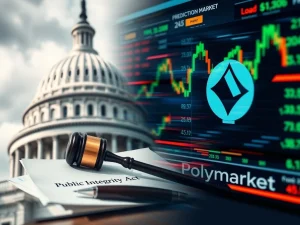Urgent: New York Lawmakers Propose Crypto Sales Tax Threatening Digital Assets

A significant development is unfolding for the cryptocurrency community. New York lawmakers have introduced a bill that could dramatically reshape the landscape for digital asset holders and businesses. This proposed legislation aims to impose a **New York crypto tax** on sales and transfers, a move that could have far-reaching implications for the state’s vibrant financial sector.
New York Crypto Tax Proposal Unveiled
New York Assemblymember Phil Steck recently introduced Assembly Bill 8966. This bill seeks to add a 0.2% excise tax on all “digital asset transactions.” Such transactions include the sale or transfer of digital assets. This proposed **crypto sales tax NY** would take effect immediately upon passage. Furthermore, it would apply to all sales and transactions starting September 1.
The state anticipates significant tax revenue from this measure. New York City, after all, stands as a global financial and fintech hub. Many industries there have embraced crypto, investing billions in tokens or offering crypto-based financial products. This new levy could therefore generate substantial funds for state programs.
Funding Substance Abuse Programs with Digital Asset Tax
Assemblymember Steck’s bill specifies the intended use for the generated revenue. Funds from this proposed **digital asset tax** would expand substance abuse prevention and intervention programs. These vital programs would specifically target schools in upstate New York. The bill clearly outlines its scope. It would amend existing state tax laws. The new levy would apply to “digital currencies, digital coins, digital non-fungible tokens or other similar assets.” This broad definition ensures comprehensive coverage of various digital asset types.
Navigating the Legislative Journey for Digital Asset Tax
The proposed bill faces multiple steps before becoming law. First, it must pass an Assembly committee. Next, it will proceed to a vote before the full Assembly. If approved there, the bill then moves to the Senate for their consideration. Finally, if the Senate passes it, the bill goes to the governor. The governor holds the ultimate power to either sign it into law or issue a veto. This process highlights the legislative hurdles the bill must overcome.
State Crypto Sales Tax Landscape
Taxation of cryptocurrencies varies widely across the United States. Both federal and state governments possess the authority to levy taxes. This dual system often leads states to adjust their tax policies. Some states, for example, lower or even scrap corporate and income taxes. This strategy aims to attract companies seeking to minimize their tax burdens. Most states currently lack specific guidance on how their tax authorities treat crypto. However, states like California and New York typically treat crypto as cash. Conversely, other states, such as Washington, offer tax exemptions for crypto, according to Bloomberg Tax. This patchwork of regulations underscores the complex environment for **crypto regulation New York** and beyond.
New York’s Enduring Role in Crypto Regulation
New York, particularly New York City, has long served as a base for major crypto industry players. Its status as a global finance center attracts significant blockchain and digital asset firms. Prominent stablecoin issuers like Circle Internet Group and Paxos are headquartered in the city. Crypto exchange Gemini and analytics firm Chainalysis also call New York home. Many other crypto firms operate offices within the state. This concentration of industry heavyweights makes any new **New York crypto tax** proposal particularly impactful.
New York also pioneered comprehensive crypto regulatory regimes. In 2015, the state introduced the BitLicense. This permit proved highly divisive. Many crypto companies left the state, citing its burdensome requirements. Yet, others, including Circle, Paxos, and Gemini, embraced the opportunity for regulation. They became key players under the **NY BitLicense** framework. This history demonstrates New York’s long-standing influence on the crypto industry.
Potential Impact on the Crypto Ecosystem
The proposed 0.2% excise tax, while seemingly small, could create a ripple effect. For instance, it might increase transaction costs for active traders. Businesses operating in New York could face additional compliance burdens. This could potentially influence investment decisions and the overall flow of capital into the state’s digital asset market. Furthermore, the bill’s passage could inspire similar legislative efforts in other states. This would further complicate the national **crypto regulation New York** landscape. Stakeholders across the industry are closely watching these developments. The outcome will certainly shape the future of digital asset transactions within New York and possibly beyond.
The proposed **New York crypto tax** represents a significant legislative effort. It seeks to generate revenue while navigating the complexities of digital asset taxation. The bill’s journey through the state legislature will be closely monitored by the entire cryptocurrency industry. Its potential passage could set a precedent for future crypto regulation and taxation across the United States. This ongoing development highlights the increasing integration of digital assets into traditional financial and regulatory frameworks.









